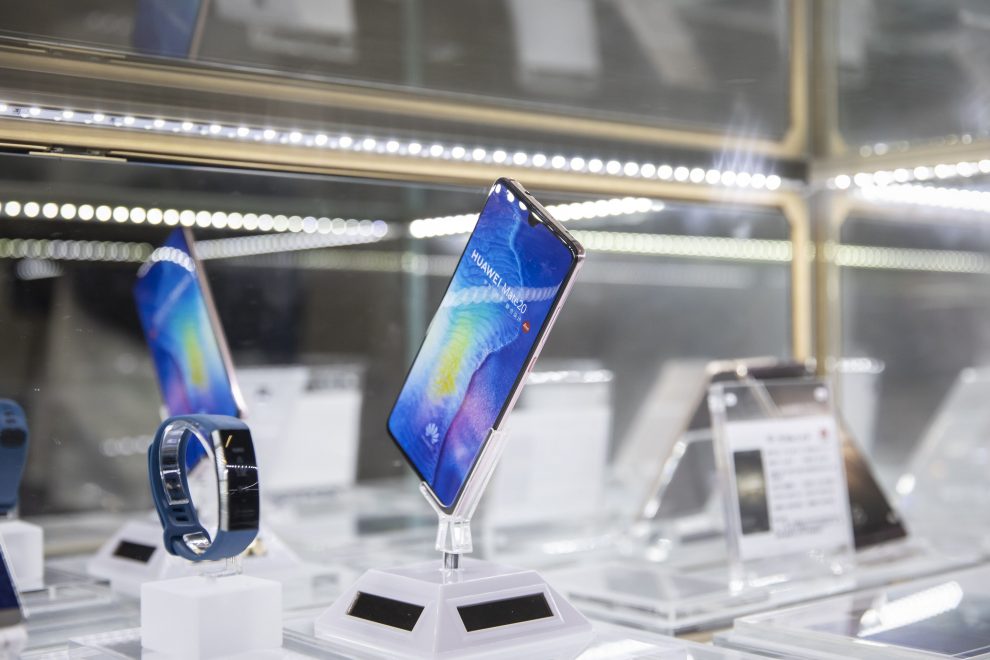
(Bloomberg) — Huawei Technologies Co. has seen a dramatic slowdown in sales growth as it deals with U.S. efforts to curb its business and warned of tougher days ahead.
Revenue at the telecommunications giant increased 13% in the June quarter to 221.6 billion yuan ($32 billion), down from the 39% of the three months ended March, according to Bloomberg News calculations from first half numbers released on Tuesday. The latest results are the first since the Trump administration effectively banned U.S. companies from working with Huawei, forcing it to plug holes in its consumer business and adjust staffing levels.
Chairman Liang Hua said the supply of critical components from the U.S. hasn’t resumed, despite Donald Trump’s proclamation in June that the company would be able to buy some American technology again. For example, the U.S. government hasn’t given Google approval to supply the Shenzhen-based giant with Android software, which is essential for mobile phones it wants to sell globally. Liang said in an interview that Huawei can roll out its own software to install on devices if it remains blocked from the world’s most popular smartphone operating system.
“We don’t know when the U.S. government will make the decision on Android and when that decision will come,” Liang said in an interview with Bloomberg Television. “If we are not able to use Android for our new smartphones, we have the ability to develop our own operating system.”
Concessions offered at the G-20 meeting in Osaka in June by President Trump aren’t making much of a difference. At the time, the president said he would allow some U.S. companies to supply technology products to Huawei provided there weren’t security concerns, but they need explicit Commerce Department approval.
“The entity list had put a disruptive challenge to our supply chain. The difficulties and complex of supply chain changes are huge,” Liang said in an interview with Bloomberg Television.
In the first half, revenue rose 23% to 401.3 billion yuan ($58 billion), the company said in a statement. That compares with the 15% pace of a year earlier. Huawei wouldn’t confirm Bloomberg calculations of the second quarter sales.
Huawei’s smartphone shipments for the half jumped 24% to 118 million units. Earlier this summer, Bloomberg News reported Huawei was preparing for a drop in international shipments of 40 million to 60 million units as the Trump administration’s blacklisting hammered one of its key businesses. Liang said sales had recovered to a level that was 80% that prior to the U.S. ban, adding that the company would not give up its overseas business because of the restrictions.
“Given the foundation we laid in the first half of the year, we continue to see growth even after we were added to the entity list,” said Liang. “That’s not to say we don’t have difficulties ahead. We do, and they may affect the pace of our growth in the short term.”
Huawei is unable to sell certain fifth-generation wireless products to lucrative markets such as Japan, Australia and New Zealand. Liang downplayed the impact of the ban on 5G sales, saying that the company had secured new contracts since the ban was introduced.
Efforts to counter the effect of the ban will entail additional costs. “We need to invest a lot of manpower and resources in places like replacement products, supply chain continuity management and safeguarding customers delivery, all these efforts will impact our performance in second half,” said Liang.
Huawei could adjust human resources based on business performance, Liang told a briefing without elaborating. Billionaire founder Ren Zhengfei himself has warned of a strategic scale-back, saying the company of more than 180,000 employees needed to “orderly withdraw” from certain businesses.
Executives told staff to brace for tougher times over the remainder of 2019, people familiar with the matter have said. Ren said in June that the sanctions would curtail Huawei’s revenue by roughly $30 billion in the coming two years, wiping out its growth.
Huawei is preparing for the worst and is pulling out all the stops right now to boost sales, assigning as many as 10,000 engineers across three shifts a day to work on alternatives to American software and circuitry. The company is trying to boost internal morale, granting awards to a number of employees for helping it avert an immediate crisis, people familiar have said.
Huawei’s growing dominance in 5G networking, the technology expected to power a modern economy and drive innovations from self-driving cars to robot surgery, lies at the center of U.S.-Chinese tensions. Both sides are moving toward their first face-to-face trade negotiations in months. U.S. companies have lobbied Washington to lift those restrictions, arguing the Chinese company could easily find replacements elsewhere.
It’s unclear how Washington will respond, given deep-seated suspicion of a company lawmakers accuse of stealing technology and aiding Beijing in espionage — which Huawei has repeatedly denied.
Huawei, however, is regarded by some as a bargaining chip in sensitive trade negotiations and may gain a reprieve depending on how things play out.
To contact Bloomberg News staff for this story: Gao Yuan in Beijing at [email protected]
To contact the editors responsible for this story: Peter Elstrom at [email protected], Colum Murphy, Robert Fenner
<p class="canvas-atom canvas-text Mb(1.0em) Mb(0)–sm Mt(0.8em)–sm" type="text" content="For more articles like this, please visit us at bloomberg.com” data-reactid=”39″>For more articles like this, please visit us at bloomberg.com
©2019 Bloomberg L.P.












